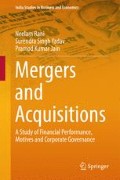Abstract
This chapter presents the research methodology followed in the study to assess the impact of mergers and acquisitions on financial performance . It also enumerates the research objectives, hypotheses, sources of primary data (based on questionnaire survey , personal interviews, emails and telephonic calls) and secondary data (drawn from Bombay Stock exchange, SEBI, Prowess database Centre for Monitoring Indian Economy, Thomson Security Data Corporation (SDC) Platinum M&A database), data analysis (primarily in terms of abnormal returns, major financial ratios), event study methodology , statistical techniques used in the study and research model.
Access this chapter
Tax calculation will be finalised at checkout
Purchases are for personal use only
Notes
- 1.
BSE SENSEX (Bombay Stock Exchange Sensitivity Index) is a ‘Market Capitalisation—Weighted’ Index of 30 component stocks representing a sample of large well established and financially sound companies. It is reckoned as a benchmark index of the Indian capital market.
References
Boehmer, E., Musumeci, J., & Poulsen, A. (1991). Event study methodology under conditions of event-induced variance. Journal of Financial Economics, 30(2), 253–272.
Bowman, R. G. (1983). Understanding and conducting event studies. Journal of Business Finance & Accounting, 10(4), 561–584.
Brown, S. J., & Warner, J. B. (1980). Measuring security price performance. Journal of Financial Economics, 8(3), 205–258.
Brown, S. J., & Warner, J. B. (1985). Using daily stock returns: the case of event studies. Journal of Financial Economics, 14(1), 3–31.
Campbell, C. J., Cowan, A. R., & Salotti, V. (2010). Multi-country event study methods. Journal of Banking & Finance, 34(12), 3078–3090.
Corrado, C. (1989). A nonparametric test for abnormal security-price performance in event studies. Journal of Financial Economics, 23(2), 385–395.
Corrado, C. J., & Truong, C. (2008). Conducting event studies with Asia-Pacific security market data. Pacific-Basin Finance Journal, 16(5), 493–521.
Corrado, C. J., & Zivney, T. L. (1992). The specification and power of the sign test in event study hypothesis tests using daily stock returns. Journal of Financial and Quantitative Analysis, 27(3), 465–478.
Cowan, A. R. (1992). Nonparametric event study tests. Review of Quantitative Finance and Accounting, 1(4), 343–358.
Cowan, A. R. (2007). Eventus 8.0 Users Guide, Standard Edition 2.1. Ames Lowa: Cowan Research LC.
Duso, T., Gugler, K., & Yurtoglu, B. (2010). Is the event study methodology useful for merger analysis? A comparison of stock market and accounting data. International Review of Law and Economics, 30(2), 186–192.
Fama, E. F., Fisher, L., Jensen, M., & Roll, R. (1969). The adjustment of stock prices to new information. International Economic Review, 10(1), 1–21.
Giaccotto, C., & Sfiridis, James M. (1996). Hypothesis testing in event studies: The case of variance changes. Journal of Economics and Business, 48(4), 349–370.
Henderson, Jr, & Glenn, V. (1990). Problems and solutions in conducting event studies. Journal of Risk and Insurance, 57(2), 282–306.
Kang, J. K., & Stulz, R. M. (1996). How different is Japanese corporate finance? An investigation of the information content of new security issues. Review of Financial Studies, 9(1), 109–139.
Konchitchki, Y., & O’Leary, Daniel E. (2011). Event study methodologies in information systems research. International Journal of Accounting Information Systems, 12(3), 99–115.
Kothari, S. P., & Warner, J. B. (2007). Econometrics of event studies. Chapter 1 in Handbook of Corporate Finance-Empirical Corporate Finance. Elsevier B.V.
MacKinlay, A. C. (1997). Event studies in economics and finance. Journal of Economic Literature, 35(1), 13–39.
McWilliams, A., & Siegel, D. (1997). Event studies in management research: theoretical and empirical issues. Academy of Management Journal, 40(3), 626–657.
McWilliams, T. P., & McWilliams, Victoria, B. (2000). Another Look at Theoretical and Empirical Issues in Event Studies Methodology. The Journal of Applied Business Research, 16(3), 1–11.
Mikkelson, W. H., & Partch, M. M. (1988). Withdrawn security offerings. Journal of Financial and Quantitative Analysis, 23(2), 119–134.
Patell, J. M. (1976). Corporate forecasts of earning per share and stock price behavior: empirical tests. Journal of Accounting Research, 14(2), 246–276.
Peterson, P. P. (1989). Event studies: A review of issues and methodology. Quarterly Journal of Business and Economics, 28(3), 36–66.
Salinger, M. (1992). Standard errors in event studies. Journal of Financial and Quantitative Analysis, 27(1), 39–53.
Serra, A. P. (2004). Event study tests—a brief survey. Gestão. Org-RevistaElectrónica de GestãoOrganizacional, 2(3), 248–255.
Tabak, D. (2010). Use and misuse of event studies to examine market efficiency. Insight in Economics, NERA Economic Consultancy. http://www.nera.com/content/dam/nera/publications/archive2/PUB_Use_Misuse_of_Event_Studies_0410_final.pdf
Wells, William H. (2004). A beginner’s guide to event studies. Journal of Insurance Regulation, 22(4), 61–70.
Weston, J. F., Mitchell, M. L., & Mulherin, J. H. (2004). Takeovers, restructuring, and corporate governance (4th ed.). New Delhi: Pearson Education.
Author information
Authors and Affiliations
Corresponding author
Rights and permissions
Copyright information
© 2016 Springer Science+Business Media Singapore
About this chapter
Cite this chapter
Rani, N., Yadav, S.S., Jain, P.K. (2016). Research Methodology. In: Mergers and Acquisitions. India Studies in Business and Economics. Springer, Singapore. https://doi.org/10.1007/978-981-10-2203-6_2
Download citation
DOI: https://doi.org/10.1007/978-981-10-2203-6_2
Published:
Publisher Name: Springer, Singapore
Print ISBN: 978-981-10-2202-9
Online ISBN: 978-981-10-2203-6
eBook Packages: Economics and FinanceEconomics and Finance (R0)

